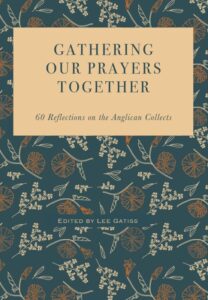60 Reflections on the Anglican Collects
Edited by Lee Gatiss
Church Society, 2023.
The collects in the 1662 Book of Common Prayer are:
“short prayers which “collect” together particular concerns and themes expressed in the liturgy – and invariably combine clear and easily-memorable phrasing with a highly concentrated shot of doctrine.” (Page 253).
The Revd Lee Gatiss has assembled 60 people from the evangelical tradition of the church to write a reflection on each collect.
The Book of Common Prayer collects are a healthy dose of “old time religion”. Today’s culture affirms people as they are. These collects do the opposite. They tell us what, in our darker moments, we know to be the real truth – we are miserable sinners who need God’s forgiveness. The Collect for the Fourth Sunday in Lent:
“Almighty God,
grant that we,
who for our evil deeds justly deserve your judgment,
may mercifully be delivered by your grace,
through our Lord and Saviour Jesus Christ.
Amen.” (Page 91)
Bishop Julian Dobbs writes the commentary on this collect:
“No one is better than anyone else – we are all sinners! … Confessing that we have evil deeds leads us to acknowledge that we are deserving of God’s judgment… However, we are not left there… We have been mercifully delivered by his grace, through Jesus Christ our Lord and Saviour.” (Pages 92-92).
Today’s culture says that the power to transform ourselves is in our hands. These collects say opposite – we can do nothing without God. The Collect for the Second Sunday in Lent:
“Almighty God,
you see that we have no power of ourselves to help ourselves:
Keep us both outwardly in our bodies,
and inwardly in our souls,
so that we may be defended
from all adversities that may happen to the body,
and from all evil thoughts which may assault and hurt the soul,
through Jesus Christ our Lord.
Amen. (Page 83).
The Revd Jason Ward writes on this collect:
“My experience and my culture tell me that I am self-determined, independent, powerful. And I have that false confidence right to the point someone takes my job from me. Right to the point the doctor looks at me and says he is referring me for some tests… The Western world has told me often enough what my pride wants to hear – I’m good, I’m kind, I’m fair… And I can believe my goodness will see me home – right to the point I look to my own motives and my own actions, to my own thoughts, and the twisted places they sometimes go… Only God, who creates, owns and sustains the universe has that power and right. In Jesus’s name, we turn to you to deliver us – body and soul.” (Pages 83-85).
Today we tend to be too busy. We think that by doing lots of stuff is the way to achieve in life. These collects say the first priority is our relationship with God. The Collect for the Nineteenth Sunday after Trinity:
“Almighty God,
since without you we are not able to please you,
mercifully grant that your Holy Spirit
may in all things direct and rule our hearts,
through Jesus Christ our Lord.
Amen.” (Page 223).
Helen Thorne writes the commentary on this collect. God:
“is more interested in a relationship than in our efforts – he takes more pleasure in our dependence than us exhausting ourselves to pursue our plans… And yet, so often, we prioritise doing over depending. The devotions get squeezed, and the dialogue we engage in most is with our friends (or foes) rather than our Father.” (Page 226)
By having only evangelical commentators there are no heretical views, but the comments can be ‘samey’. This struck me particularly with the Collect for the Sixteenth Sunday after Trinity, which focusses on God’s pity:
“Almighty God,
let your continual pity cleanse and defend your church,
and, because it cannot continue in safety without your aid,
preserve it evermore by your help and goodness,
through Jesus Christ our Lord.
Amen.” (Page 213).
The Revd Peter Blair writes the commentary on this collect. The word “pity” isn’t used much in the evangelical lexicon. So, what would the commentator say about it? In his commentary he writes about, “repentance” and “grace” – which are good evangelical words, but which don’t appear in this collect. He makes only one reference to “pity”, which is in the collect, but simply implies it is identical to love: “This love is then demonstrated in the Gospel reading, when Christ, moved with pity, raises the widow of Nain’s son to life.” (Page 213).
Overall, this book reminds us how good the collects in the Book of Common Prayer are and can be helpful in our daily prayers today.
August 2024
Adrian Vincent
